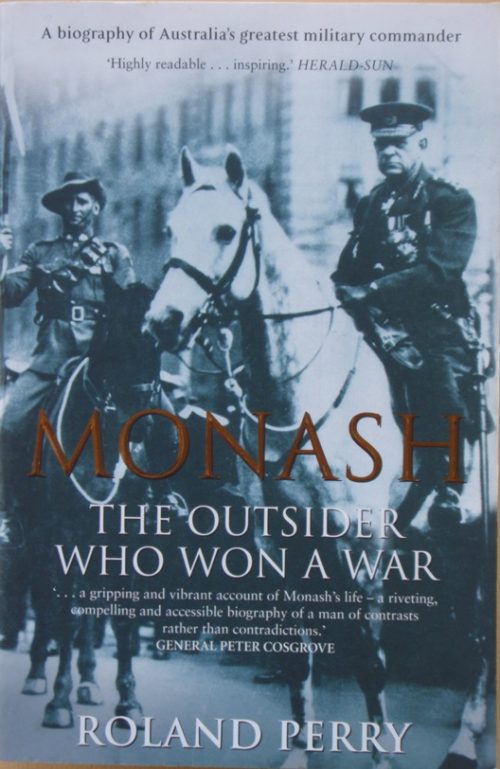Description
Title: John Monash – A Biography
Author: Serle, Geoffrey
Condition: Very Good
Edition: 5th Edition
Publication Date: 1990
ISBN: 0522842399
Cover: Hard Cover with Dust Jacket – 600 pages
Comments: The compelling story of one of Australia’s arguably best generals – General Sir John Monash. Couple of small tears to dust jacket else in very good condition.
General John Monash, GCMG, KCB Arguably Australia’s most famous soldier, John Monash was born in Melbourne on 27 June 1865. He was dux of Scotch College and studied arts and engineering at Melbourne University, where he was also involved in debating and student politics. Outside of university he dabbled in acting. In 1884 he joined the university company of the 4th Battalion, Victorian Rifles. Monash was a driven young man, ambitious and intelligent. He worked on the construction of the Princes Bridge in Melbourne and in 1888 was placed in charge of constructing a new railway even though he had yet to complete his degree.
A keen womaniser throughout his life, Monash married Hannah Moss in April 1891 after having had several other relationships, some quite scandalous by contemporary standards. He finished his studies in 1895 and, having long since decided to combine engineering with a military career, was promoted to captain in the Garrison Artillery that year. In 1897 Monash was promoted to major in the North Melbourne Battery and served there for 11 years. Meanwhile, he and a friend had established a private engineering practice in 1894.
The business grew steadily but a series of setbacks left him with large debts in 1902. Starting again, Monash recovered and became wealthy. He also gained promotion to lieutenant colonel in the Australian Intelligence Corps in 1908. Now prospering in business and the Army, in 1913 Colonel Monash took command of the 13th Infantry Brigade. After the outbreak of war, Monash took command of the AIF’s 4th Infantry Brigade, landing at Gallipoli on 26 April 1915. In July he was promoted to brigadier. Despite having encountered some criticism for his performance on Gallipoli, Monash took his brigade to France in June 1916. He became a major general in July and took command of the 3rd Division.
The division’s first major battle, Messines, was hailed as a great success. Further success followed and in May 1918, Monash was promoted to lieutenant general and given command of the Australian Corps. His first battle in this role, Hamel, came to be considered the “perfect battle”. Monash remained in command through the victorious battles in the last months of the war. He was an innovative leader who earned high praise from many leading political and military figures, but he also faced criticism for exaggerating his own and his soldiers’ achievements.
By the end of the war his force was exhausted and severely depleted. After spending eight months in London overseeing the repatriation of the AIF, Monash was welcomed home in Melbourne by an enthusiastic public on Boxing Day 1919. He returned to business and in 1920 became manager of Victoria’s State Electricity Commission. An advocate for returned soldiers, Monash also held a range of high-level positions. His opinions were widely sought and he became a leading figure in Melbourne’s Jewish community. Monash died of heart disease in Melbourne on 8 October 1931 and was given a state funeral attended by some 250,000 mourners.




